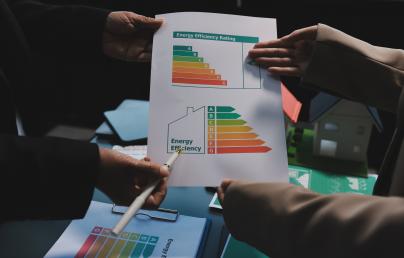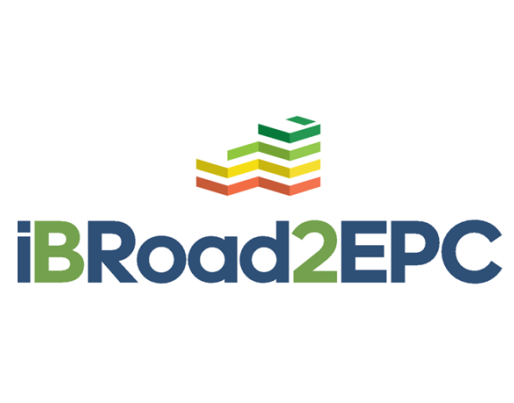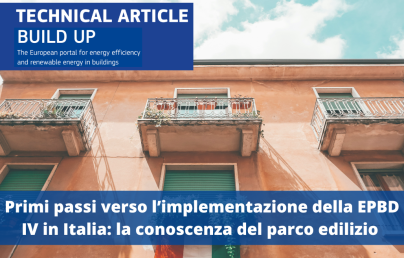
A blueprint for success: How a modular renovation passport can accelerate deep renovation

A blueprint for success: How a modular renovation passport can accelerate deep renovation
The iBRoad2EPC project, funded by the EU's Horizon 2020 programme, developed an affordable, adaptable and modular renovation passport that helps Member States meet most of the mandatory and optional requirements for renovation passports listed in the EPBD, according to their national priorities and targets. This approach also helps Member States to bridge the gap between EPCs and renovation passports, integrating them to motivate building owners to undertake staged deep renovations.
The building stock is far off track to achieve climate neutrality by 2050. Beyond decarbonisation, we also know that the negative consequences of unrenovated buildings on human health are significant, and rising energy prices are having a significant negative impact on citizens’ purchasing power.
The 2024 recast of the Energy Performance of Buildings Directive (EPBD) has responded to this, laying the framework for an ecosystem of tools that should in principle upscale deep renovation, fast. Among other elements, for the first time ever, it introduces a framework for renovation passports in Article 12 as a voluntary tool, to facilitate and simplify the renovation process for building owners.
Renovation passports – a valuable tool for decision making in the renovation journey and asset valuation
The renovation passport is a valuable tool for building owners and investors to make informed decisions. It provides high-quality recommendations for staged deep renovations and actionable information to implement them.
Financial actors could use renovation passports as a fundamental tool for asset valuation and link them to green mortgage programmes, taking advantage of the ongoing programmes and in line with the EU taxonomy. The integration of EPC and renovation passports with incentive programmes could improve their effectiveness by (1) prescribing clearer guidelines for public administrations on what renovation interventions should be incentivised with priority; (2) tying the exact amount of funds to specific and measurable energy improvements; and (3) providing building owners with clear, reliable and actionable information, thus making renovations more accessible.
Member States are now required to establish a scheme of renovation passports based on the common framework set out in EPBD Annex VIII, effectively enabling owners and investors to plan their renovation measures over time to transform existing buildings into Zero-Emission Buildings (ZEBs) well before 2050. In addition, the EPBD recognises the potential synergies between renovation passports and Energy Performance Certificates (EPCs) and encourages their joint development and issuance.
iBRoad2EPC: effective EPBD compliance through a modular approach
The iBRoad2EPC project, funded by the EU's Horizon 2020 programme, developed an affordable, adaptable and modular renovation passport that helps Member States meet most of the mandatory and optional requirements for renovation passports listed in EPBD Annex VIII, according to their national priorities and targets. This approach also helps Member States to bridge the gap between EPCs and renovation passports, integrating them to motivate building owners to undertake staged deep renovations.
A user-friendly web interface at the front-end of the iBRoad2EPC renovation passport guides energy professionals through the data entry and editing process. The back-end tool of the renovation passport produces standardised online, but printable, output documents that are easier to navigate and update than paper formats. Building owners receive high quality recommendations consistent with the deep renovation and national building renovation plans. The renovation passport can be issued as an attachment to the EPC or as an additional output page through a URL or QR code in their EPC. It offers a Basic Module which incorporates the staged deep renovation advice as an output. Additionally, upon demand, add-on modules currently include the Investment Cost module, Energy Demand module, Indoor Environmental Quality module (IEQ), Smart Readiness Indicator module (SRI) and Measured Energy Performance Indicator module (MEPI). Other modules can be added into the basic application as needed. The modular structure allows easy integration with other existing tools such as EPC software and databases through Extensible Markup Language (XML), XLS, or Application Programming Interface (API) integration.
Critical lessons and priorities for effective implementation of renovation passports
Experience in the six iBRoad2EPC pilot countries highlight main results, critical lessons and priority actions for effective implementation of renovation passports. Member States can benefit from understanding these key priorities and enablers for national roll-out. By focusing on these insights, Member States can efficiently adapt the iBRoad2EPC concept to their own priorities and advance the implementation of renovation passports to support the achievement of their climate targets.
Awareness & information: National campaigns are crucial to promote deep renovation benefits and increase trust in tools like the EPC and the renovation passport, emphasising non-energy benefits such as indoor environmental quality and health alongside energy efficiency to enhance public perception and stakeholder buy-in.
Market introduction & training: Clear strategies for the adoption of renovation passports, focusing on capacity-building among energy auditors, construction professionals, and municipalities are needed. Training initiatives should support large-scale certification and renovation efforts.
Requirements for in-person onsite visits: It is necessary to ensure that both EPCs and renovation passports are issued following an onsite visit to improve the quality of data and the condition of the building. This approach will enable tailored renovation advice and enhance trust in the certification process.
Integration with EPCs: Positioning renovation passports within existing EPC frameworks is key. For example, there is a strategic market placement of the iBRoad2EPC renovation passport for every Member State, based on their existing and envisaged policy framework: iBRoad2EPC can be integrated as a mandatory component of the EPC, as a voluntary complement of the EPC, as a standalone tool, or anything in between.
Tools/Platforms: A user-friendly digital platform, like the iBRoad2EPC renovation passport assistant, is needed to create and manage passports.
Linkages with EPC databases: Seamless integration of the renovation passport with existing national EPC databases and frameworks will provide reliable information, avoid duplication and leverage on existing infrastructure. Ensure compatibility with various data sources to support efficient renovation planning and implementation.
Financial incentives: Access to financial support for deep renovations, including for renovation passports and implementation of recommended measures, needs to be simplified. Prioritise support for vulnerable groups to encourage widespread uptake of deep renovation measures.
As the transposition and implementation phase of key EU directives, such as the Energy Performance of Buildings Directive, the Renewable Energy Directive and the Energy Efficiency Directive, are imminent, Member States should take hold of out-of-the-box solutions like that offered by iBRoad2EPC. A recent report from BPIE shows how Member States can use the iBRoad2EPC renovation passport to support the implementation of the EPBD and other key directives.
The ball is now in the court of the Member States to implement effective solutions, who have two years (until 29 May 2026) to establish a renovation passport scheme. Member States should seek not only to comply with EPBD requirements, but to ensure the tools they develop in this time will achieve maximum impact. iBRoad2EPC offers a novel solution for renovation passports that enables Member States to comply with – and go well beyond - EPBD requirements. The blueprint for success is there – it’s now time to transform this vision into reality.

